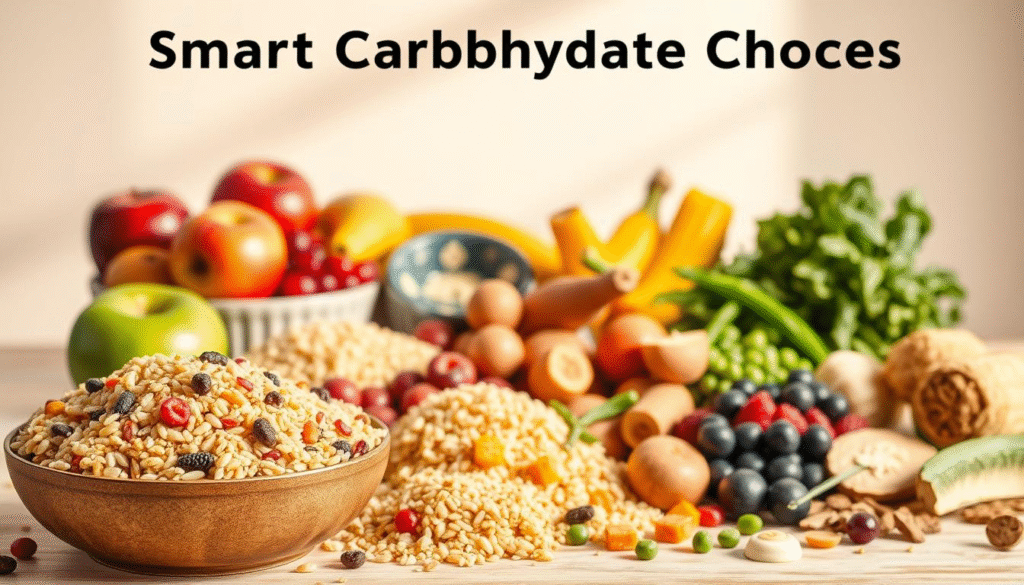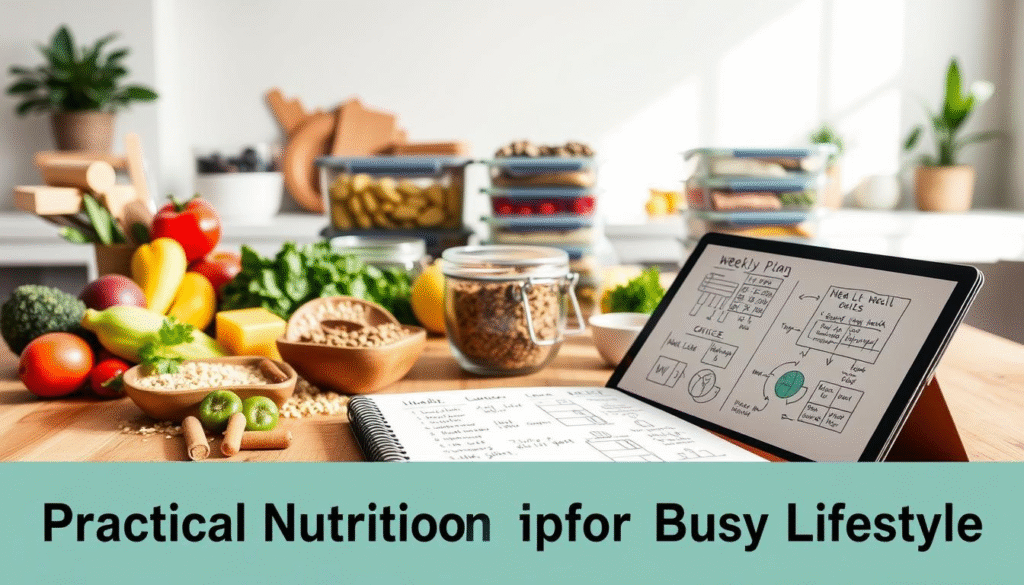Many adults find it hard to eat healthily, with nearly 70% of Americans being overweight or obese. This shows how vital it is to adopt healthy eating habits for better wellbeing.
The Eatwell Guide offers a clear plan for a balanced diet, focusing on 5 main food groups. Following this guide helps people make better food choices. This leads to better physical and mental health.

Adding wellness tips to your daily routine, like mindful eating and meal planning, can boost your wellbeing. It’s a step towards a healthier life.
Key Takeaways
- Following the Eatwell Guide can help achieve a balanced diet.
- Mindful eating is key for overall wellbeing.
- Balanced meal planning is essential for healthy eating.
- A healthy diet greatly improves physical and mental health.
- Adding wellness tips to your daily life boosts wellbeing.
The Science Behind Nutrition and Wellbeing
Exploring nutrition shows its big impact on our wellbeing and life quality. Eating right is key to staying healthy. Studies show that bad eating habits can cause many health problems.
How Food Affects Your Physical Health
What we eat directly affects our health. It changes our energy, weight, and disease risk. Eating fruits, veggies, whole grains, and lean proteins helps avoid heart disease, diabetes, and some cancers. But, eating too much junk food, sugar, and bad fats can harm us.
Our eating habits are very important for our health. Mindful eating helps digest food better and absorb nutrients. By picking the right foods, we can greatly boost our health and happiness.
The Connection Between Diet and Mental Wellbeing
There’s a strong link between what we eat and our mental health. Eating foods rich in omega-3s, vitamins, and minerals can help our minds. It might lower depression and anxiety risks. Plus, it can make us think clearer and focus better.
Knowing how diet affects our mental health helps us make better food choices. This supports both our body and mind.
Building a Foundation of Healthy Eating Habits
Healthy eating habits are key for your wellbeing. A good eating plan boosts your physical health and mental clarity. It also helps with emotional stability.
Mindful Eating Practices
Mindful eating means listening to your hunger and fullness signals. It’s about enjoying each bite and eating slowly. This way, you develop a healthier food relationship and avoid overeating.
Being mindful makes meals more enjoyable. It helps you make better food choices.
Creating a Sustainable Eating Pattern
A sustainable eating pattern includes a variety of foods. It’s about following meal planning tips to stay on track. It’s not about quick fixes but finding a balance that lasts.
This pattern should have fruits, veggies, whole grains, lean proteins, and healthy fats. It’s about finding what works for you in the long run.
Setting Realistic Nutrition Goals
Setting realistic nutrition goals is vital for lasting changes. Start by checking your current eating habits. Identify what needs improvement.
Use nutrition guidelines to set goals you can reach. For example, eat more fruits and veggies or less processed foods. Following balanced diet tips helps create a realistic and effective plan.
By using these strategies, you can build a strong base for healthy eating. This will support your overall wellbeing.
Essential Nutrition Tips for Everyday Wellness
Making smart food choices is key to a balanced diet. A few simple tips can greatly boost your health and wellbeing.
Balancing Your Plate with the Right Proportions
A balanced meal should have foods from all groups. Follow the USDA’s MyPlate guidelines. Fill half your plate with fruits and veggies, one-quarter with protein, and the other quarter with whole grains.
Timing Your Meals for Optimal Energy
Eating at regular times keeps your energy up all day. Space out your meals with a mix of protein, complex carbs, and healthy fats. This helps avoid energy crashes and supports good nutrition.
Reading Food Labels Effectively
Understanding food labels is key for healthy choices. Look for products with minimal added sugars, less sodium, and healthy fats. Know the serving sizes and how many servings are in a container to track your nutrients.
| Nutrient | What to Look For | Why It Matters |
| Added Sugars | Less than 8g per serving | Reduces risk of chronic diseases |
| Sodium | Less than 200mg per serving | Supports heart health |
| Healthy Fats | Presence of unsaturated fats | Promotes heart health and satisfaction |
By following these nutrition tips daily, you can move towards a healthier lifestyle.
Hydration: A Critical Component of Nutrition
Hydration is key for both physical and mental health. Drinking enough water helps our bodies work right. It keeps us cool and helps digest food.
Calculating Your Daily Water Needs
How much water you need depends on your age, sex, weight, and how active you are. Drinking at least eight 8-ounce glasses a day is a good start. But, some might need more, depending on their lifestyle and where they live.
| Activity Level | Daily Water Intake Recommendation |
| Sedentary | 8 cups (64 oz) |
| Moderately Active | 10 cups (80 oz) |
| Very Active | 12 cups (96 oz) |
Signs of Dehydration to Watch For
Dehydration shows up in different ways, like a dry mouth, feeling tired, or dizzy. Spotting these signs early helps you drink more water quickly.
Hydrating Foods and Beverages Beyond Water
Drinking water isn’t the only way to stay hydrated. Eating foods with lots of water can also help. Cucumbers, watermelon, and celery are great choices.
Knowing how important hydration is and adding hydrating foods and drinks to your diet helps a lot. It supports your nutrition and overall health.
Protein: The Building Blocks for Health
Protein is key for our health, both physically and mentally. It’s found in almost every cell in our body. It helps build and fix tissues like muscles, bones, and skin.
Complete vs. Incomplete Protein Sources
Proteins are made of amino acids, some of which our bodies can’t make. Complete protein sources have all nine essential amino acids. Incomplete protein sources are missing one or more.
Animal products like meat, eggs, and dairy are complete proteins. But many plant-based foods are incomplete proteins.
Plant-Based Protein Options
If you eat plants, it’s important to mix different protein-rich foods. This ensures you get all the amino acids you need. Legumes, like beans and lentils, are great for protein. So are nuts and seeds.
Mixing different plant-based proteins, like whole grains with legumes, gives you a full amino acid profile.
How Much Protein Do You Really Need?
How much protein you need depends on your age, sex, weight, and how active you are. The RDA says sedentary adults need 0.8 grams of protein per kilogram of body weight daily. But athletes or those trying to build muscle might need more.
Talking to a healthcare provider or nutritionist can help figure out your protein needs.
Knowing how protein helps our health and making smart choices about it can boost our wellbeing. It helps us reach our nutrition goals.
Smart Carbohydrate Choices for Sustained Energy
Choosing the right carbohydrates is key for lasting energy. Carbs are our body’s main energy source. The right carbs can boost our health and productivity.
Understanding the Glycemic Index
The glycemic index (GI) shows how fast foods raise blood sugar. High GI foods quickly raise blood sugar. Low GI foods release glucose slowly, keeping energy steady.
Whole Grains vs. Refined Carbohydrates
Whole grains like brown rice and quinoa offer more fiber and nutrients than refined carbs. Whole grains give energy for longer. Refined carbs, like white bread, quickly raise then drop blood sugar, making you tired.
| Carbohydrate Type | Examples | Energy Release |
| Whole Grains | Brown rice, Quinoa, Whole wheat bread | Slow and Sustained |
| Refined Carbohydrates | White bread, Sugary snacks | Rapid |
Fiber-Rich Foods for Digestive Health
Fiber-rich foods are great for digestion and energy. Foods like fruits, veggies, and whole grains help control blood sugar. They also make you feel full, preventing unhealthy snacking.

Learning about the glycemic index and choosing whole grains over refined carbs is smart. Adding fiber-rich foods to your diet supports sustained energy and health.
Healthy Fats: Essential Nutrients for Optimal Function
Adding the right fats to your diet is key for good health. Healthy fats help with energy and vitamin absorption. They are vital for our bodies.
Omega-3s and Their Role in Reducing Inflammation
Omega-3 fatty acids fight inflammation. They are good for the heart and help with arthritis symptoms. You can find omega-3s in salmon and sardines, and also in flaxseeds and walnuts.
Sources of Heart-Healthy Monounsaturated Fats
Monounsaturated fats are healthy for the heart. They lower bad cholesterol. You can find them in avocados, olive oil, and almonds and pecans. Eating these foods can make your heart healthier.
Fats to Limit in Your Diet
Not all fats are good. Saturated and trans fats can harm your heart. Avoid foods like processed and fried foods that are high in these fats. Choose healthier options for a balanced diet.
| Type of Fat | Sources | Health Benefits |
| Omega-3 Fatty Acids | Salmon, sardines, flaxseeds, walnuts | Reduces inflammation, supports heart health |
| Monounsaturated Fats | Avocados, olive oil, almonds, pecans | Lowers total and LDL cholesterol |
| Saturated Fats | Processed meats, full-fat dairy products | Raises LDL cholesterol; should be limited |
Practical Nutrition Tips for Busy Lifestyles
Busy lives often mean we eat less well. But, simple meal planning can really help. A few smart strategies can keep you healthy, even when days are hectic.
Meal Prepping Strategies That Actually Work
Meal prepping is a big help for those short on time. It means making meals ahead to save time later in the week.
Time-Saving Preparation Techniques
Efficient meal prepping starts with batch cooking. This means making lots of one ingredient, like rice, to use all week.
- Cook proteins like chicken or beans in bulk.
- Roast a variety of vegetables at once.
- Prepare individual portions to grab on the go.
Storage Solutions for Freshness
Keeping prepped meals fresh is key.
- Use airtight containers to keep food fresh.
- Label containers with the date and contents.
- Store meals in the refrigerator or freezer to prolong freshness.
Quick and Nutritious Meal Ideas
Having quick, healthy meal ideas is important. Look for meals that take less than 30 minutes, like stir-fries or omelets.
Some examples include:
| Meal | Ingredients | Prep Time |
| Avocado Toast | Whole grain bread, avocado, eggs | 5 minutes |
| Salad Jar | Mixed greens, vegetables, lean protein | 10 minutes |
| Overnight Oats | Rolled oats, milk, fruit, nuts | 5 minutes (prep ahead) |
Smart Grocery Shopping on a Budget
Shopping for groceries on a budget doesn’t mean you have to eat less well. Plan your shopping and stick to your list to save money and time.
Buy in bulk, choose seasonal produce, and pick store-brand items to cut costs.

Overcoming Common Nutrition Challenges
Getting the right nutrition can be tough due to many obstacles. These include emotional eating, social pressures, and stress. But, there are ways to beat these challenges.
Managing Cravings and Emotional Eating
Mindful eating is key to controlling cravings and emotional eating. It helps you listen to your body’s hunger and fullness signals. Practicing mindfulness means enjoying each bite slowly. This can stop you from eating too much.
Navigating Social Eating Situations
Social eating can be tricky, but you can handle it. Eat a healthy meal before going to social events to avoid overeating. Also, remember to keep an eye on your portion sizes.
Adapting Your Diet During High-Stress Periods
Stress can mess with your eating habits. In stressful times, stick to nutrient-dense foods. Simple meals like soups or salads are good for your health and easy to make.
Using these tips, you can beat common nutrition challenges. This way, you can keep your diet healthy.
Personalizing Your Nutrition Approach
Creating a nutrition plan that fits your needs is key for good health. Your body’s needs change based on your age, health, and how you live.
Nutrition Through Different Life Stages
Nutritional needs shift as we age. For example, adolescents and young adults need more protein for growth. On the other hand, older adults need more calcium for strong bones. Here are some important points to remember:
- Increased protein for adolescents and young adults
- Higher calcium intake for older adults
- Balanced diet for pregnant women

Dietary Adjustments for Specific Health Concerns
Some health issues require special diets. For instance, people with diabetes must watch their carb intake. Those with hypertension should eat less sodium. Here are some key adjustments:
- Monitoring carbohydrate intake for diabetes management
- Reducing sodium for hypertension
- Increasing fiber for digestive health
By making these changes, you can manage your health better and feel better overall.
Conclusion
To summarize, improving your wellbeing starts with good nutrition tips. We’ve looked at many nutrition aspects and their health benefits. By eating healthy, drinking enough water, and choosing the right foods, you can boost your wellbeing.
Experts say, “Nutrition is the foundation of overall health and wellbeing.” By following the wellness tips we discussed, you can live a balanced life. Remember, the path to better health is continuous. Making lasting lifestyle changes is key.
Sources
This article’s information comes from trusted sources. These include health and nutrition organizations, scientific journals, and registered dietitians. For more details and references, please check out the links below:
Harvard Health Publishing offers insights on health and nutrition.
The American Chemical Society provides educational resources on nutrition and health.
For more on nutrition and wellbeing, visit Mayo Clinic and WebMD. They offer detailed health and nutrition information.
FAQ
What are some simple ways to improve my wellbeing through nutrition?
Eating a balanced diet is key. Include fruits, veggies, whole grains, lean proteins, and healthy fats. The Eatwell Guide can help you start.
How does diet impact mental health?
Diet and mental health are closely linked. Eating whole foods supports mental health. But, processed and sugary foods can harm it.
What are some mindful eating practices I can adopt?
Mindful eating means listening to your hunger and fullness. Eat slowly and enjoy your food. This helps you eat better and less.
How can I balance my plate for optimal nutrition?
Balance your plate with different food groups. Include lots of fruits and veggies, whole grains, lean proteins, and healthy fats.
How much water should I drink daily?
Your water needs depend on age, sex, weight, and activity. Aim for at least eight cups (64 ounces) a day. More is needed if you’re active or in a hot climate.
What are some good sources of protein?
Good protein sources are lean meats, fish, eggs, dairy, legumes, and nuts. Beans, lentils, and tofu are also great for a balanced diet.
What are the benefits of whole grains over refined carbohydrates?
Whole grains have more fiber, vitamins, and minerals than refined carbs. They support digestion and lower disease risks like heart disease and diabetes.
How can I make healthy choices when grocery shopping on a budget?
Plan meals, buy in bulk, and choose affordable whole foods like beans and grains. Look for sales on healthy items too.
How can I manage cravings and emotional eating?
Manage cravings by staying hydrated and finding stress relief. Identify triggers and plan to avoid temptation.
How can I personalize my nutrition approach?
Tailor your nutrition to your needs, like your health and lifestyle. A healthcare professional or dietitian can help create a plan just for you.
